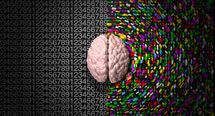Digital humanities combines computing with style—but there are mixed feelings
 Did you know that almost all of the academic resources that you access online have been thoughtfully, and skillfully, presented by skilled computer technologists? And did you know that those computational experts are also in the humanities?
Did you know that almost all of the academic resources that you access online have been thoughtfully, and skillfully, presented by skilled computer technologists? And did you know that those computational experts are also in the humanities?
Users may take the ease with which they access digital archives and online projects for granted without thinking about the work that goes into creating such websites. What starts out as physical documents stacked upon a desk ultimately become the images or PDFs that people search for online after being scanned, organized, and attached with metadata by dedicated digital humanists.
Digital humanists do much of the behind-the-scenes work — such as developing resources, working on mapping or archival projects, and dating mining — that allows the public to peruse research and archives online.
The field of digital humanities relates to work that is at the “intersection of computational technology and humanities content,” said Johanna Drucker, a professor at UCLA and co-author of the book Digital_Humanities.
The human cultural record is slowly transitioning to an online platform. The task is “hugely time consuming and it takes skill, knowledge and coordination amongst institutional players,” Drucker said.
(Next page: Explaining the controversy)
Current university endeavors in digital humanities include Stanford’s “Mapping the Republic of Letters” project, which includes examples of networks of correspondence before people relied on eMail, and Loyola University in Chicago’s “Woolf Online” project, which features drafts of author Virginia Woolf’s To the Lighthouse.
Data is “running our lives,” Drucker said. From museums to university libraries, every entity is dependent on people who are skilled with the digital environment, she added.
When building an online database, digital humanists must figure out the best ways to shape, model and access resources. Digital humanities is “more the way we do our work,” Drucker said, adding that it’s “really interesting and so much fun.”
With the ongoing STEM vs. humanities debate, digital humanities is one way for universities to link the two together.
Stanford University recently created a joint major program that combines computer sciences with the humanities, slated to begin in the fall.
Many universities have been able to create digital humanities programs after receiving grants from organizations such as the Andrew W. Mellon Foundation. For example, in November 2013, the University of Rochester received a $1 million grant from the Mellon foundation to invest in the emerging field of digital humanities.
Backlash?
Though the field has gained popularity in recent years with the advancement of technology, it has actually been around for quite some time. Columnist Rebecca Schuman wrote that digital humanities is the “incarnation” of humanities computing.
Humanities computing dates back to the late 1940s, when IBM worked with Roberto Busa to create a computer search tool of Thomas Aquinas’ work, Drucker said. Not until the creation of the internet did the field of digital humanities start to gain popularity.
But after all of the hype that came with the emergence of digital humanities a few years ago, many scholars such as Adam Kirsch are saying the build-up has led to disappointment.
According to Kirsch, the digital humanities failed to “launch humanities disciplines into national conversation,” as it was predicted to do. And Harvard’s 2013 report on mapping the future of the humanities barely touched upon the subject of digital humanities.
Some also argue that digital humanities are a waste of university spending, but Drucker disagrees.
“I think people should stop bashing digital humanities because it’s not responsible for the ills of the university,” Drucker said, adding that it has become popular to blame digital humanities for taking money away from the rest of the humanities.
Experimentation with the interaction between humanities and technology has been slow, but the work behind digital humanities may be a step in the right direction. Only time will tell if the field lives up to the hype that came with it during its emergence.
Molly Schulson is an editorial intern at eCampus News.
- Survey: More students want to go to graduate school - April 24, 2024
- Educause, AWS launch generative AI readiness assessment tool for higher ed - April 23, 2024
- A bungled FAFSA rollout threatens students’ college ambitions - April 19, 2024

